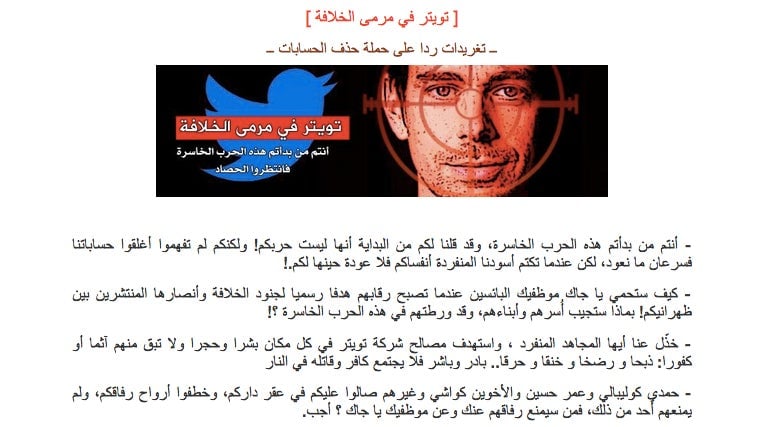ISIL has threatened Twitter employees after the company blocked its accounts
This post has been updated.

This post has been updated.
A statement posted online and shared by supporters of the militant group the Islamic State has made threats (link in Arabic) against the co-founder of Twitter and its employees, after the social media company took steps to block accounts that shared violent images and used inciting language.

The post mentions Jack Dorsey, the co-founder of Twitter, by name and is headed with a picture of his face with the sights of a gun superimposed over it. The authorship of the post is unclear, according to Buzzfeed, which first reported the online threats. It also mentions by name the men who launched deadly attacks on the satirical newspaper Charlie Hebdo in Paris in January.
Update (March 2, 2015, 9:30am): Twitter sent this response to Quartz’s request for a comment: ”Our security team is investigating the veracity of these threats with relevant law enforcement officials.”
From the first, social media has been central to the Islamic State machine. When the group began waves of attacks in Iraq in June they were accompanied by thousands of tweets—”67,000 and counting” in a single week, according to a Vice News article at the time.
Twitter and other online and social media companies have responded by blocking accounts that urge violence or where images of acts of brutality are shared. Twitter’s rules and terms of service prohibit the use of the site for “violence and threats,” as well as other abusive behavior. But the systems for removing such content were not developed with such threats in mind, and have become a game of “whack-a-mole,” according to the Guardian, that does little to stop the violent content from proliferating.
Many Islamic State fighters are young, and have grown up in a world where using social media to plan activities and share beliefs and propaganda comes naturally.
It was in videos disseminated on social media, for example, that the British-accented fighter Mohammed Emwazi rose to fame. Another widely shared video showed the killing of a group of Egyptian Christians—staged on a beach, with a hundred fighters costumed in black for maximum effect. And a fighter from the same group as Emwazi tweeted an image of himself wearing a mask and holding a severed head.
In an indication of how difficult it is to suppress content once it’s online, news of the threat against Twitter–and the image of the threat itself—is being shared widely on the network.